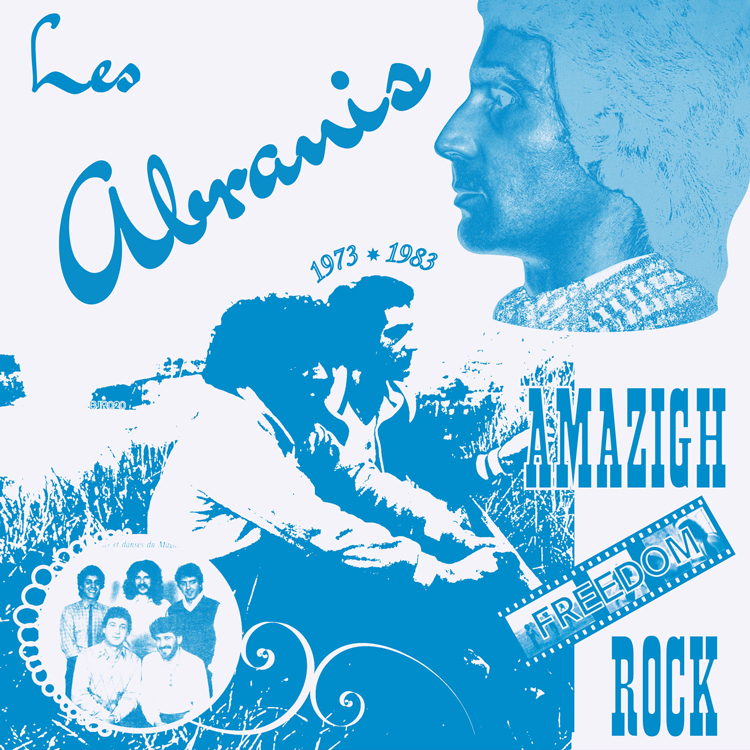Les Abranis – Amazigh Freedom Rock 1973-1983 (Bongo Joe Records, 2023)
Bongo Joe Records delves once again into the realm of Kabyl rock with Les Abranis, an Algerian band that emerged as pioneers in the fusion of traditional Berber music and Western rock, folk, disco, and funk. The band proudly celebrated their Kabyl heritage, carving a path of musical innovation that left an indelible mark on the Maghreb music scene, captivating audiences from Algeria to France. In fact, France became a new hub for the creative endeavors of the Kabyl diaspora.
Les Abranis’ latest offering, “Amazigh Freedom Rock 1973-1983,” serves as a comprehensive exploration of their discography, tracing their musical evolution from the garage-rock experimentation of their early years to the lavishly orchestrated North African fusion pieces that defined the 1980s.
The story of Les Abranis begins in the mid-1960s when two young Algerians, Shamy El Baz and Karim Abdenour, crossed paths in one of Paris’ free spirited neighborhoods. Both hailing from the Kabyl community, which comprises the Berber people from the northern regions of Algeria, they had sought refuge from the repressive political climate that followed Algeria’s independence in 1962 and the subsequent establishment of a conservative constitution.
“Considered a threat to the newly formed nation-state due to their affiliation with an older nation, predating both the Algerian state and the presence of Muslim/Arab culture in North Africa,” explains musical anthropologist Simon Debarbieux, who contributed the liner notes for the compilation, shedding light on the historical context surrounding Les Abranis’ emergence.
Shared ancestry was not the sole bond between El Baz and Abdenour. They also shared a profound love for rock music and a fervent desire to cultivate a modern Algerian sound that drew inspiration from Kabyl rhythms and melodies as well as Western rock influences. Paris, with its cosmopolitan character, provided an ideal backdrop for their creative pursuits. Debarbieux explains, “The Kabyls were the earliest Algerian immigrants to settle in France during the early 20th century, establishing bars and actively engaging in musical production. Their community was distinct from that of the Algerian-Arabs and remained sizable and tightly-knit.“
Paris offered the Kabyl diaspora an unprecedented level of artistic freedom, and music became the medium through which Shamy and Karim could champion, celebrate, and fortify their Kabyl identity. Simultaneously, their residence in the French capital enabled them to mingle with the broader North African community, a factor that progressively infused the Abranis’ musical style with new influences alongside the prevailing trends of the time, ranging from progressive rock to disco.
In 1967, the two musicians founded Les Abranis, joined by bass player Madi Mehdi and drummer Samir Chabane. Together, they embarked on a journey of musical experimentation, intertwining Kabyl vocals and melodies with garage and psychedelic rock elements.
The compilation’s opening track, “Athedjaladde,” serves as an example of their distinctive style, featuring an unwavering emphasis on scintillating guitars, entrancing organ sounds, and infectious, funk-infused rhythms. However, it was precisely this audacious mix of swirling psychedelia, chant-like vocals, and spirited handclapping in the track “Avetheri A L’Afjare” that nearly resulted in the band’s expulsion from Algerian national television during the 1973 Festival of Modern Algerian Song. Given the patriotic nature of the event, intended to celebrate traditional Algerian culture, the sight of these youthful Berber individuals, hailing from Paris, performing an intriguing fusion of Kabyl music and rock was perceived as an affront.
Despite the initial bewilderment of the audience, they were simultaneously captivated by Les Abranis’ music and their visually striking aesthetic. This unprecedented combination gave birth to the legend of Les Abranis, and the band was met with great enthusiasm upon their return to France.
Over the subsequent years, Les Abranis released a handful of singles through various North African labels based in France. They embarked on a tumultuous Algerian tour and experienced several lineup changes. While tracks like the fervent, Doors-esque “Chenar Le Blues” exemplified Shamy and Karim’s ability to refine their fiery blend of Kabyl roots and rock, the band gradually departed from the confines of garage and psychedelia as the 1970s unfolded. Instead, they embarked on a journey of interpretation, seeking new, open, and creative avenues within their Kabyl repertoire.
The 1980 synth-disco song “Therrza Rathwemza” serves as an early testament to their evolving approach, characterized by marching rhythms, synthesizers, and interplay between somber male and sensual female vocals. This track delves even further into their fusion of traditional and experimental elements. Another notable composition from the same album, the evocative “Thillelli,” reaffirms Abranis’ unwavering support for the Amazigh cause, effortlessly infusing twanging guitars and otherworldly synths with subtle expressions of pride.
Many of the tracks featured on the compilation are sourced from Les Abranis’ seminal 1983 album, N1. This record stands as the pinnacle of their pursuit to create a modern Algerian sound infused with diverse musical influences from around the world. To realize their vision, they enlisted the support of Corsican jazz drummer André “Dédé” Ceccarelli, who had previously collaborated with the Algerian Kabyl superstar Idir, as well as several accomplished progressive rock producers.
The resulting compositions exhibit eclecticism as well as refined craftsmanship. Ranging from the North African reggae vibes of “Avehri” to the boundary-pushing arrangements of “Achethkhii,” the album effortlessly traverses musical landscapes. Interestingly, despite the ultimate mainstream success achieved by N1, the band initially encountered difficulty in finding a record label willing to support the project and thus took it upon themselves to produce the album. This marked a turning point for modern Kabyl music, as the electrified folk stylings of rai began to swiftly overshadow Les Abranis’ golden era.
For a few years, Les Abranis continued to tour and create music, but by the 1990s, their collective output ceased entirely.
Buy Amazigh Freedom Rock 1973-1983.


